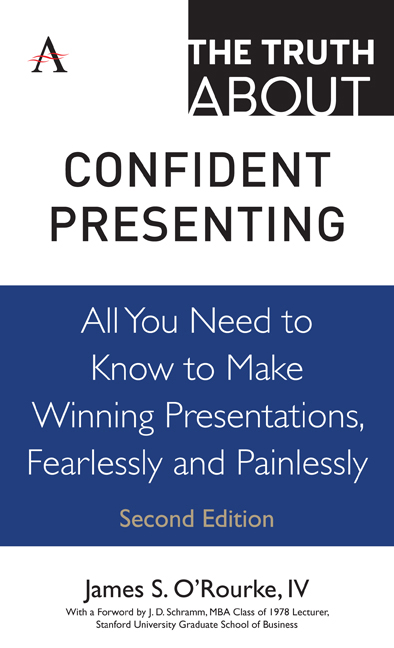 The Truth about Confident Presenting
The Truth about Confident Presenting Book contents
- Frontmatter
- Contents
- Foreword
- Introduction
- Part I Some Initial Truths
- Truth 1 Public speaking is not easy, but it's certainly doable
- Truth 2 The key to success is preparation
- Truth 3 Rehearsal is essential
- Truth 4 Emulating good speakers makes you better
- Truth 5 Establish goals for your presentation
- Truth 6 A presentation is a learning occasion
- Part II The Truth About Getting Ready to Speak
- Part III The Truth About What Makes People Listen
- Part IV The Truth About Developing Support for Your Presentation
- Part V The Truth About Getting Up to Speak
- Part VI The Truth About Managing Anxiety
- Part VII The Truth About Nonverbal Communication
- Part VIII The Truth About Visual Aids
- Part IX The Truth About Handling an Audience
- Part X The Truth About What Makes a Presentation Work
- References
- Acknowledgments
- About the Author
Truth 4 - Emulating good speakers makes you better
from Part I - Some Initial Truths
- Frontmatter
- Contents
- Foreword
- Introduction
- Part I Some Initial Truths
- Truth 1 Public speaking is not easy, but it's certainly doable
- Truth 2 The key to success is preparation
- Truth 3 Rehearsal is essential
- Truth 4 Emulating good speakers makes you better
- Truth 5 Establish goals for your presentation
- Truth 6 A presentation is a learning occasion
- Part II The Truth About Getting Ready to Speak
- Part III The Truth About What Makes People Listen
- Part IV The Truth About Developing Support for Your Presentation
- Part V The Truth About Getting Up to Speak
- Part VI The Truth About Managing Anxiety
- Part VII The Truth About Nonverbal Communication
- Part VIII The Truth About Visual Aids
- Part IX The Truth About Handling an Audience
- Part X The Truth About What Makes a Presentation Work
- References
- Acknowledgments
- About the Author
Summary
A learning curve charts the learning progression of someone who is acquiring a new skill. Educational psychologists find that most learners experience a slow rate of progress at first, followed by a rapid acceleration of new knowledge or ability, followed in turn by a flattening of the curve as time progresses. In other words, most students typically struggle at first with the concepts, vocabulary and processes involved in learning a new skill. Many discouraged students think about quitting. Consider, for example, when you tried to learn how to play the piano or ride a bicycle. Acquiring a complex motor skill requires discipline, patience and dedication.
Research on public speaking has shown two basic phenomena related to learning. First, a concentrated program of instruction, rehearsal and critique can produce significant improvements in performance in a relatively short period of time. And second, the confidence acquired early in the process can result in higher levels of achievement over time.
The lessons from these findings are simple. Learning to present in public is much easier, for example, than learning to write or becoming an informed, critical listener. Confidence also plays a huge role in motivating inexperienced speakers to continue speaking, practicing and to accept the challenge of presenting under stressful, high-stakes conditions. You gain confidence with every successful presentation, which inspires you to take on other opportunities and take additional risks. The process begins with instruction, which really means watching and listening to successful speakers. People who can stand up and present successfully in front of others— offering compelling stories, dramatic narrative or powerful evidence— seem at first to be relatively rare. Most of us don't know many people who are that good, but I'm willing to bet that you know more of those people than you think.
Think about the best speakers you know, the ones who are always good when they get up to speak. My local church has an assistant rector who is really good. When he gives a homily on Sunday, he doesn't step up in the pulpit and read from a set of prepared remarks. He steps down in front of the altar, with nothing to hide behind and nothing to take his eyes off the congregation, and speaks to us. He's confident, full-throated, and full of enthusiasm.
- Type
- Chapter
- Information
- The Truth about Confident PresentingAll You Need To Know To Make Winning Presentations, Fearlessly And Painlessly, pp. 13 - 16Publisher: Anthem PressPrint publication year: 2019


